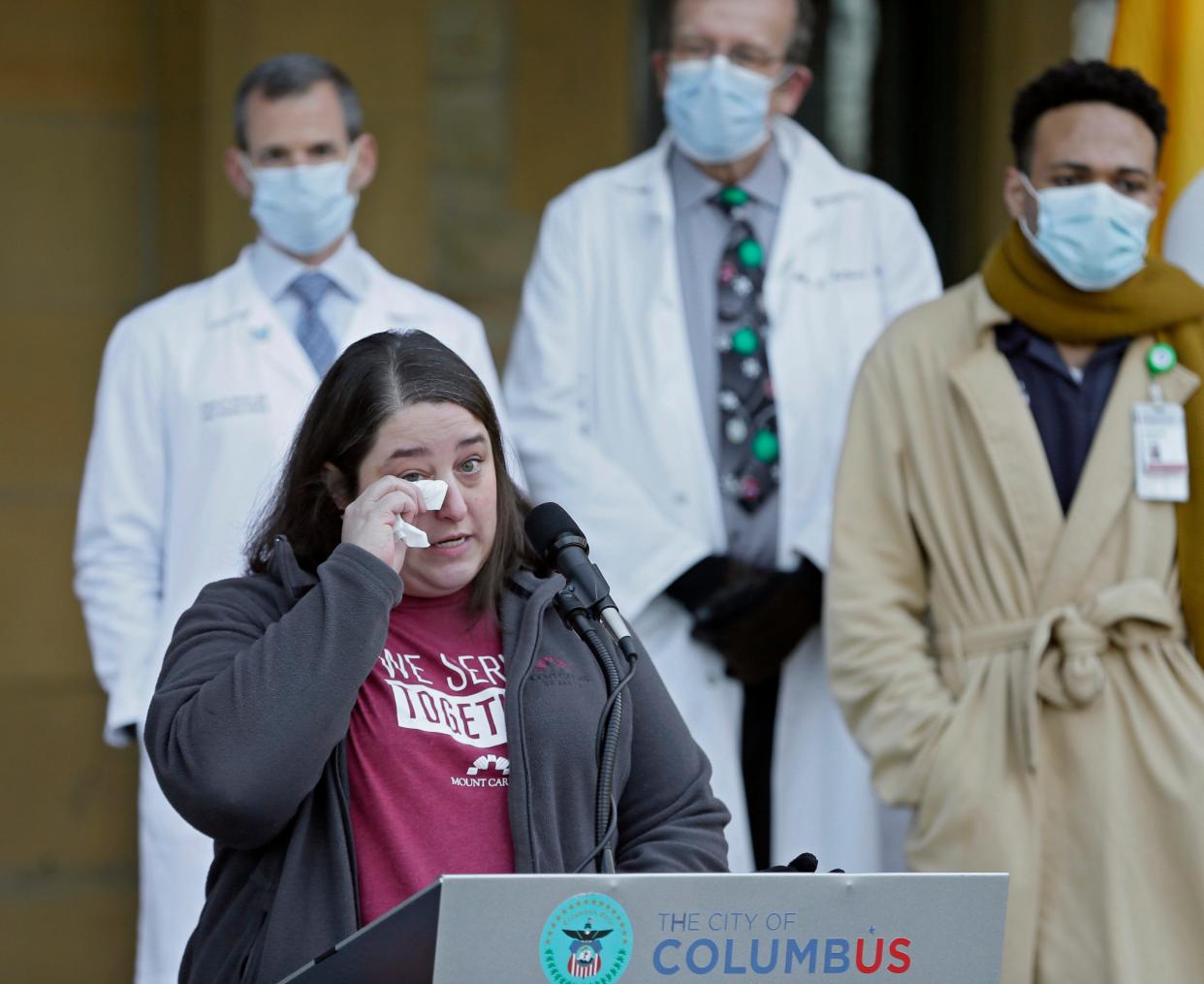Letters: Hospital RN's overworked. Sufficient staffing needed to keep them, patients safe.

'Dangerous conditions' in hospitals
I write to bring attention to dangerous and hazardous conditions in hospitals that must not and need not exist.
More: Omicron forces nursing homes to freeze admissions, strands more Ohioans at hospitals
Our congresspersons need to co-sponsor the Nurse Staffing Standards for Hospital Patient Safety and Quality Care Act of 2021 (House Resolution 3165/Senate Bill 1567).
Sufficient staffing is vital to keep nurses and patients safe — safe staffing saves lives.
This act would set specific safety limits on the number of patients each RN can care for.
More: "Doctors and nurses crying after their shifts," CMO says. 'Health care heroes' need support
There is no shortages of registered nurses. As of Nov. 6, 2021, the National Council of State Boards of Nursing states that more than 4.4 million RN's are available, yet according to the U.S. Bureau of Labor statistics, only 3.2 million are employed as RN's — with only 1.8 million employed in hospitals.
Russ Doyle, Cincinnati

Where is 'free money' going?
I am an avid supporter of passenger rail.
I lived in Zaragoza, Spain for 8 years in the 1990s. Construction on a new rail station in Zaragoza began in the late 1990s simultaneously with new tracks, both dedicated to high-speed trains. Visiting in 2007, I rode the Madrid-Zaragoza and then the Zaragoza-Barcelona connections.
The rides were smooth and fast, cutting the previous three-hour trips by half.
More: Ohio exploring passenger rail expansion with Amtrak
The Obama administration earmarked $400 million dollars for Ohio for 3-C “high-speed rail.” The projected average speed? About 35 miles per hour. Why? Passenger trains would run on existing tracks, shared with freight trains, which take priority.
Upon arrival, how do you get around? That’s easy in Europe. Not so in Ohio or the United States.
More: MORPC, Columbus Partnership throw weight behind Amtrak expansion in Ohio
California is building a high-speed connection between San Francisco and Los Angeles. The initial cost estimate? Thirty-two billion dollars. Updated cost estimate? Almost $100 billion. It is years behind schedule, and initial construction is only in a portion of central California.
It’s valid to ask, “What do we really get for all this ‘free money’?”
Norberto Viamonte, Dublin

Share your thoughts: How to submit a letter to the editor for The Columbus Dispatch
Prioritize Alzheimer's care
At a time when more than 6 million Americans are living with Alzheimer’s, including more than 220,000 Ohioans, prioritizing how this devastating disease is addressed remains a critical issue for our country.
In May, I joined more than 700 Alzheimer’s advocates in Washington, D.C., to speak on behalf of the millions dealing daily with this devastating disease.
More: Alzheimer's disease affects millions including the caregivers; more support is needed
Much progress has been made in the fight against Alzheimer’s over the last decade, thanks in part to the National Alzheimer’s Project Act (NAPA) and the Alzheimer’s Accountability Act (AAA).
With the National Alzheimer’s Project Act and Alzheimer’s Accountability Act set to expire in 2025, updated legislation is critically needed to help those impacted by Alzheimer’s. By 2050, the number of people ages 65 and older with Alzheimer’s could rise to 13 million, barring the development of medical breakthroughs to prevent, slow or cure Alzheimer’s disease.
More: Column: Task force charged with improving care of Alzheimer's patients
Thankfully, Congress can play an important role in addressing this critical issue. Please join the Alzheimer’s Association in encouraging our members of Congress, including Rep. Joyce Beatty, Rep. Mike Carey, Rep. Bob Gibbs, and Rep. Troy Balderson, to address this public health crisis by supporting the National Alzheimer’s Project Act Reauthorization Act and the Alzheimer’s Accountability and Investment Act. The time to act is now.
Vince McGrail, executive director, Alzheimer’s Association, Central Ohio chapter
This article originally appeared on The Columbus Dispatch: Letters: More registered nurses needed in hospitals for safety

